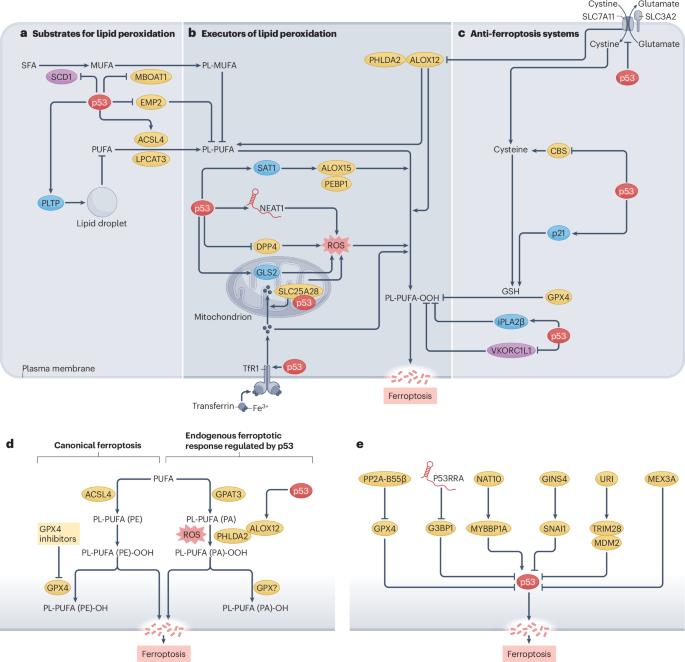p53调控的非凋亡细胞死亡途径及其在癌症和其他疾病中的相关性
IF 90.2
1区 生物学
Q1 CELL BIOLOGY
引用次数: 0
摘要
程序性细胞死亡是许多生理和病理过程的关键机制。虽然p53介导的细胞凋亡是癌症细胞死亡的主要途径,但越来越多的证据表明,p53在控制不同的非凋亡性细胞死亡(NACD)途径中也起着至关重要的作用,包括铁凋亡(ferroptosis)、坏死凋亡(necroptosis)、焦亡(pyroptosis)、自噬依赖性细胞死亡、内源性细胞死亡、旁咽下细胞和旁凋亡(parthanatos),并可能调节PANoptosis、cuprotosis和diulfidptosis。值得注意的是,p53在这些nnacds中的功能在很大程度上有助于其生物学效应,特别是在癌症发展和其他病理过程中。在这篇综述中,我们讨论了p53介导的NACDs的作用和潜在机制的最新进展,重点是铁下垂、坏死性下垂和焦下垂。我们讨论了NACDs受p53调控的复杂而独特的生理环境,以及p53调控的NACDs治疗癌症和其他人类疾病的潜在靶点。最后,我们强调了关于p53调控的NACDs的几个值得进一步研究的重要问题。本文章由计算机程序翻译,如有差异,请以英文原文为准。


p53-regulated non-apoptotic cell death pathways and their relevance in cancer and other diseases
Programmed cell death is a mechanism that is crucial for numerous physiological and pathological processes. Whereas p53-mediated apoptosis is a major cell death pathway in cancer, accumulating evidence indicates that p53 also has crucial roles in controlling different non-apoptotic cell death (NACD) pathways, including ferroptosis, necroptosis, pyroptosis, autophagy-dependent cell death, entotic cell death, parthanatos and paraptosis, and may regulate PANoptosis, cuproptosis and disulfidptosis. Notably, the function of p53 in these NACDs substantially contributes to its biological effects, particularly in cancer development and other pathological processes. In this Review, we discuss recent advances in understanding the roles and underlying mechanisms of p53-mediated NACDs, focusing on ferroptosis, necroptosis and pyroptosis. We discuss the complex and distinct physiological settings in which NACDs are regulated by p53, and potential targeting of p53-regulated NACDs for the treatment of cancer and other human diseases. Finally, we highlight several important questions concerning p53-regulated NACDs that warrant further investigation. The tumour suppressor p53 controls non-apoptotic cell death (NACD) pathways, including ferroptosis, necroptosis and pyroptosis. This Review discusses the roles, mechanisms and physiological settings in which NACDs are regulated by p53, and their potential targeting for the treatment of human diseases.
求助全文
通过发布文献求助,成功后即可免费获取论文全文。
去求助
来源期刊
CiteScore
173.60
自引率
0.50%
发文量
118
审稿时长
6-12 weeks
期刊介绍:
Nature Reviews Molecular Cell Biology is a prestigious journal that aims to be the primary source of reviews and commentaries for the scientific communities it serves. The journal strives to publish articles that are authoritative, accessible, and enriched with easily understandable figures, tables, and other display items. The goal is to provide an unparalleled service to authors, referees, and readers, and the journal works diligently to maximize the usefulness and impact of each article. Nature Reviews Molecular Cell Biology publishes a variety of article types, including Reviews, Perspectives, Comments, and Research Highlights, all of which are relevant to molecular and cell biologists. The journal's broad scope ensures that the articles it publishes reach the widest possible audience.

 求助内容:
求助内容: 应助结果提醒方式:
应助结果提醒方式:


